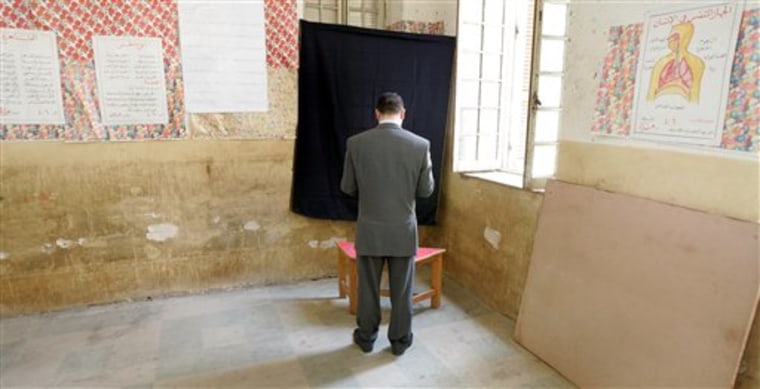A trickle of Egyptians voted on Monday in a referendum on constitutional amendments that would help the ruling National Democratic Party exclude opposition Islamists from the political system.
All major opposition groups including the influential Muslim Brotherhood told supporters to boycott the referendum, saying they cannot be sure the voting will be fair.
The changes ban political activity or parties based on religion, which could drive the Brotherhood out of politics.
The independent Committee for Democracy Support, which deployed 300 observers, said overall turnout was no more than 3 percent by 5 p.m. local time.
Several polling stations in Cairo shut down 40 minutes before the official closing time of 7 p.m. About two dozen polling stations visited by Reuters in three cities were either deserted or had only a handful of voters.
Information Minister Anas el-Feki said preliminary turnout figures showed that between 23 and 27 percent of voters showed up. He gave a rundown of the turnout in 18 of the 27 provinces, ranging from 15 percent to 60 percent.
He said results would be known "within a day or more."
Human rights groups in Egypt and abroad have criticized the amendments, which will perpetuate the government's broad powers to detain people in the name of combating terrorism.
Rice visited Sunday
Although the United States joined in the criticism last week, on Sunday U.S. Secretary of State Condoleezza Rice, in Egypt on a visit, said the changes were "not a matter to try to dictate to Egypt."
On Monday at a polling station in a Cairo working class area, seven "yes" voters interviewed by Reuters said they had not read the amendments proposed by President Hosni Mubarak.
"I did not read them," said Shehata el-Sayyed, a civil servant. Asked why he voted yes, he said: "You know, this man (Mubarak) is not bad. People around him are bad."
The government says the referendum is part of a reform program to give parliament and the prime minister more power.
The main thrust of the changes will allow the authorities more freedom to prevent political activity by the Muslim Brotherhood, which won a fifth of the seats in parliament in 2005 and could have won more if it had run more candidates.
Four volunteers working for the liberal opposition Ghad Party were detained for hours outside a polling station in the northern province of Kafr el-Sheikh, the party said.
Protest: 'Mubarak is invalid'
In Alexandria, some 300 activists, mostly members of the opposition movement Kefaya (Enough), protested with chants of "The amendments are invalid. Hosni Mubarak is invalid." Police watched from nearby but did not intervene.
The independent Egyptian Organization for Human Rights and witnesses reported incidents of the ruling party or government officials using public transport to take civil servants and public-sector employees to polling stations.
Khaled Ali, at the independent Hesham Mubarak Center, said state-owned firms had illegally bussed workers to vote.
Few Egyptians bother to vote in referendums unless they receive some incentive but several voters said they would vote against the amendments out of principle.
In the Suez Canal city of Ismailia, the ruling National Democratic Party took hundreds of university students to polling stations but many said they voted "No." One student, who asked not to be named, said professors had urged them not to vote in favor of the changes.
Ahmed Gaber, a NDP member, said reading the text was enough to make anyone vote no. "These amendments will turn Egypt into a private estate (for the Mubaraks)," he added.
